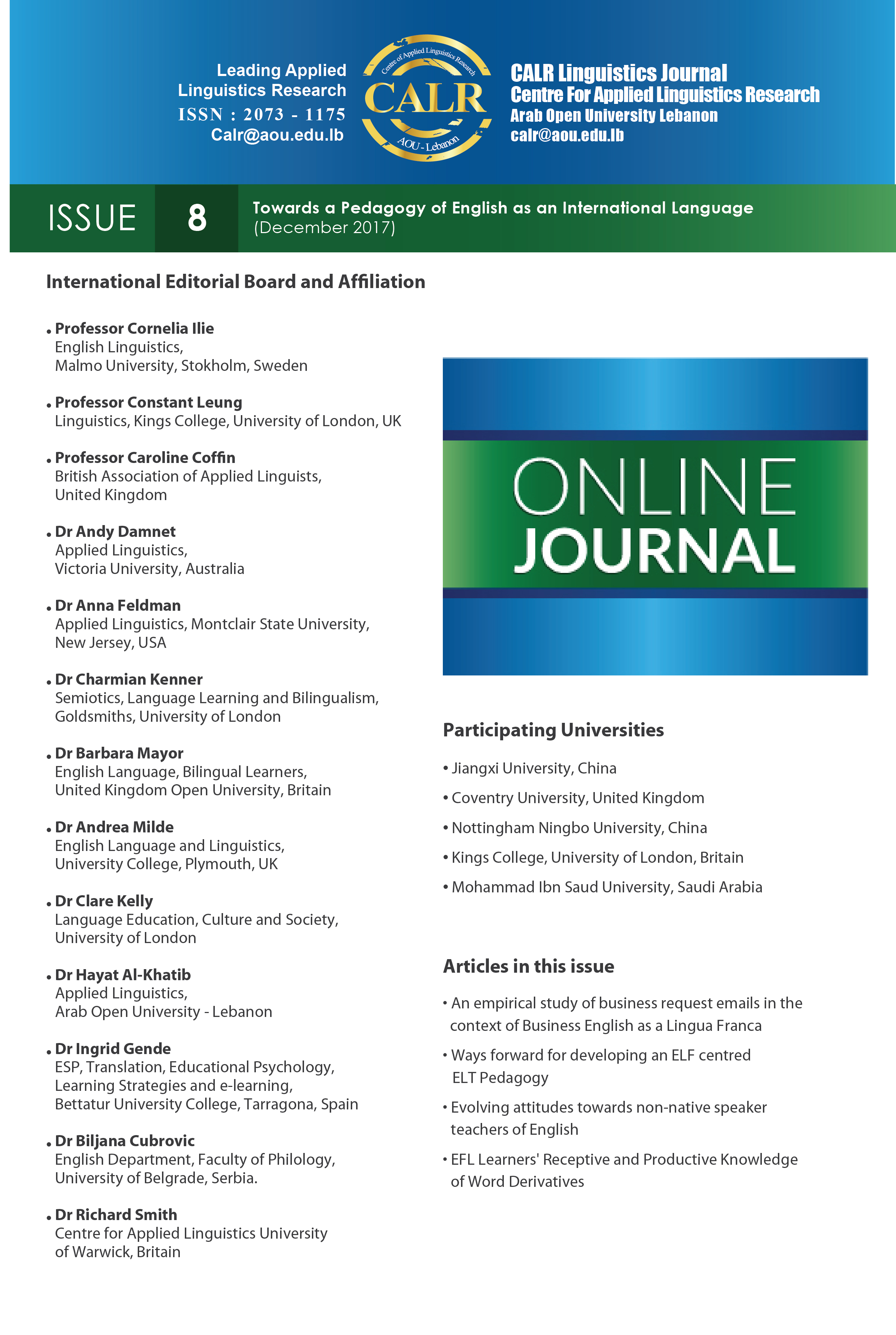
DOI: https://doi.org/10.60149/BABZ9746
An empirical study of business request emails in the context of Business English as a Lingua Franca
Author: Dr Liang Liao, Jiangxi University, China
liaol@uni.coventry.ac.uk
Professor Hilary Nesi, Coventry University, United Kingdom
aa3861@coventry.ac.uk
Abstract: This paper reports on a linguistic analysis of request emails written in English by young Business English (BE) graduates working in trading companies in China. The emails were extracted from a corpus of 307 messages (34,837 words) between these graduates and their clients around the world, mostly in countries where English is only used as a Lingua Franca. The BE graduates often dealt with multiple clients simultaneously, under considerable time constraints, and made use of templates and prefabricated phrases to speed up the writing process. The findings have interesting implications for English language teaching and the teaching of Business English as a Lingua Franca (BELF). The writers of the emails collected for this study clearly had a restricted command of English, and for this reason English language teachers might be unwilling to use authentic texts of this kind as models for their students’ writing. However, BELF usage may help to achieve business writers’ purposes more effectively than ‘textbook English’, and there may be a case for concentrating, in the Business English classroom, less on grammar and more on ways to minimise the risk of losing face.
Keywords: BELF; English as a Lingua Franca; business requests; email; Business English; English for Professional Purposes
Download link:Article 1 (PDF)
DOI: https://doi.org/10.60149/WCPY4154
Ways forward for developing an ELF centred ELT Pedagogy
Author: Dr Robert Weekly
Nottingham Ningbo University, China
rj.weekly42@gmail.com
Abstract: This paper presents a theoretical argument to augment current approaches which could serve as a basis for an English as a Lingua Franca (ELF) orientated pedagogy in ELT. There are four conceptual areas of teaching practices in ELT which have created tension between the language expected in the classroom and the socio-linguistic reality outside the classroom. These are translanguaging, the target language model, corrective feedback and assessment practices. Firstly, translanguaging in educational contexts has been extensively researched recently but not linked explicitly to ELF, though these research fields share an ontological and epistemically framework. Secondly, the principle problem with models used in ELT, is to subjugate the spoken language with the written. Therefore, these two different forms of language need explicit separation, and for speaking, where appropriate, a local model used, while at the same time, implicitly raising awareness of societal attitudes towards dialects and accents. Thirdly, corrective feedback (CF) requires a reorientation from an accuracy focused CF towards meaning focused correction. Finally, assessment practices, which for speaking, measure students spoken language against native models and does not accurately reflect students’ language competence. These four aspects would also serve as a basis for differentiating an ELF approach to ELT from a CLT approach.
Key Words:KeyWords: ELF, Pedagogy, Translanguaging, Corrective Feedback, Assessment
Download link:Article 2 (PDF)
DOI: https://doi.org/10.60149/ZITN5363
EVOLVING ATTITUDES TOWARDS NON-NATIVE SPEAKER TEACHERS OF ENGLISH
Author: Jane Jenvey
Kings College
University of London
jane.jenvey@kcl.ac.uk
Abstract: This paper is a discussion of a study into attitudes towards NNS teachers of ESOL in a London college of further education. Attitude towards ‘non-native’ speaker teachers of English is a heated topic because, ‘on a global level the ELT profession is perhaps the world’s only profession in which the majority face discrimination’ (Ali, 2009 p.37). It is not only the problem of discrimination which reflects poorly on the ELT profession but also the negative consequences of the strongly held ‘birthright mentality’ (Thomas, 1999 p.6). The data consists of seven semi-structured interviews with members of staff. The survey and the interviews confirm that there is little evidence that NNS teachers at this London are discriminated against by teacher trainers or colleagues. This is a challenge to the idea that NNS teachers are always and everywhere disadvantaged. Teacher learners should be made aware that ‘native speakerism’ or the ‘native speaker fallacy’ has no place in ELT and is not inevitable. Furthermore, there is no pedagogical basis for the notion that a native speaker teacher possesses any innate ability to teach more competently.
KeyWordsnative speakerism, NNS teachers, ESOL, ELT.Download link:Article 3 (PDF)
DOI: https://doi.org/10.60149/JAVG8495
EFL Learners' Receptive and Productive Knowledge of Word Derivatives
Author: Dr Faisal Al-Homoud
Department of English and literature,
College of Languages and Translation
Al Imam Mohammad Ibn Saud Islamic University (IMSIU),
Saudi Arabia
e-mail: faah26@gmail.com,
faalhomoud@imamu.edu.sa
Abstract: It has been assumed that L2 learners' productive knowledge of word derivatives is not predicted by their receptive knowledge, that is, learners with high levels of receptive knowledge may not be better than learners with low level of receptive knowledge in the production of word derivatives (e.g. Schmitt & Zimmerman, 2002; Collins & Nation, 2015). However, the current study does not conform to this notion, and provides new insights about EFL learners' receptive and productive knowledge of word derivative forms. The participants of the present study were 36 postgraduate students at ten different Saudi universities majoring in different schemes of English. They were requested to take an English-Arabic translation task for 16 target words, and to fill in four blanks for each target word with a suitable word derivative class (i.e. a noun, verb, adjective, or adverb). Each blank appeared in a contextualized sentence, where the participants were required to provide a suitable derivative for each blank. Each target word had four sentences with blanks that required one of the four major word classes mentioned above. These 16 words came from Schmitt and Zimmerman's (2002) study. The results showed that there is a significant correlation between the participants' receptive and productive knowledge. Furthermore, the results indicated that adjectives and nouns were the most provided derivatives on the Schmitt and Zimmerman's derivative forms test, followed by verbs and adverbs. Finally, some pedagogical implications were provided to help L2 learners increase their receptive as well as productive knowledge aspects of word derivations.
Key WordsDerivatives, receptive knowledge, productive knowledge, vocabulary size, breadth and depth knowledgeDownload link:Article 4 (PDF)
DOI: https://doi.org/10.60149/ADIW2935
